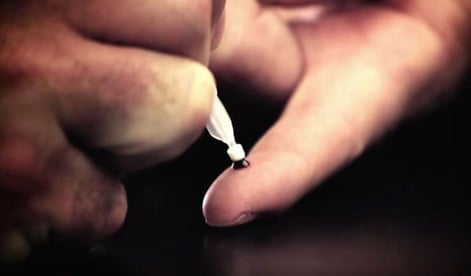Share this
COVID-19 Catalyzes Remote Blood Collection With Mitra From Neoteryx
by Neoteryx Microsampling on July 16,2020
An article by Jen A. Miller in AACC’s July 2020 online issue of Clinical Laboratory News reports that the COVID-19 pandemic has sparked wider use of telehealth, and a push towards medical devices and technologies that support patients in managing remote blood collection and specimen collection at home.
 Patient-centric collection allows patients to send their blood samples and specimens directly to labs for analysis, while they remain safe at home without risk of exposure to dangerous contagions. Designated clinical labs are processing remotely collected blood samples for COVID-19 testing, and also to help clinicians monitor other health conditions virtually in telehealth consults with patients via phone, email or video chat.
Patient-centric collection allows patients to send their blood samples and specimens directly to labs for analysis, while they remain safe at home without risk of exposure to dangerous contagions. Designated clinical labs are processing remotely collected blood samples for COVID-19 testing, and also to help clinicians monitor other health conditions virtually in telehealth consults with patients via phone, email or video chat.
According to the article, an April 2020 physician survey revealed that 85% of practitioners surveyed were using phone calls or video to consult with patients, and 77% supported this rapid shift to telehealth, or telemedicine. This shift towards using virtual care pathways for remote patient monitoring (RPM) during the coronavirus pandemic has led to increased interest in at-home blood collection and testing.
Arielle Trzcinski, a senior analyst at the market research company Forrester, is quoted in the article as saying that she predicts “a greater push on how we get to more convenient, cost-effective options for lab testing. Some vendors are already working on that, but it’s still an area that is further ripe for disruption and innovation.”
One such innovator already established in the remote blood collection space is Neoteryx, a medical device company based in Torrance, California. Neoteryx has ramped up production and shipment of its Mitra® microsamplers and Mitra® Blood Collection Kits to healthcare systems and research organizations across the US and abroad since the COVID-19 crisis gathered momentum in March 2020. The company’s Mitra devices, which collect 10, 20, or 30 μL of blood from a finger prick, are used for collecting at-home blood samples that patients can send directly to designated labs for testing.
Remotely collected blood samples for serology tests are playing a critical role in the effort to track SARS-CoV-2 antibodies to understand COVID-19 immunity and/or develop COVID-19 vaccines and treatments.
Mitra devices are being used in a National Institutes of Health (NIH) COVID-19 serology study, which is a nationwide SARS-CoV-2 antibody “Sero Survey” that is helping NIH researchers determine how many adults without a confirmed history of COVID-19 virus infection already have SARS-CoV-2 antibodies. The goal of the “Sero Survey” is to test as many as 10,000 American volunteers, who receive Mitra kits to collect their own blood samples at home.
“Unfortunately, I think it’s taken the [coronavirus] pandemic to really put a spotlight on the value of remote sampling,” Cathy Cordova, director of marketing at Neoteryx said in the AACC article. Cordova reported that although the current focus is on COVID-19, remotely collected blood sampling has other applications as well.
“Mitra is already used by organ donor transplant recipients, who need frequent blood tests to check their immunosuppression,” Cordova stated in an interview with writer Jen Miller. “Home testing lets them avoid coming into a healthcare setting repeatedly for blood draws, and makes frequent testing easier for those who live in rural areas, far from hospitals and clinics.”
The comfort and convenience of patient-centric sampling with Mitra is valued by organ transplant patients. According to the AACC article, a study recently published in The Journal of Applied Laboratory Medicine found that 82% of [transplant] patients preferred using [Mitra] microsampling devices for therapeutic monitoring of tacrolimus and cyclosporine immunosuppressants.
Another application for remote blood collection is in the realm of clinical trials. Cordova told Miller that Neoteryx has provided its Mitra microsampling devices to “several large pharmaceutical companies that have looked to implement their phase I, II, and III clinical trials for drug development through what they’re calling virtual clinical trials.” Volunteers enrolled in virtual trials can participate virtually, by collection their blood samples at home for mailing to the lab, followed by virtual consults with trial managers.
The primary focus of the AACC article, however, is on COVID-19, and the many different vendors that are working to provide home specimen collection and home testing kits. Some companies have reportedly been providing direct-to-consumer (DTC) testing services online, while others are shipping out home sampling kits for oral swab/saliva-based testing or nasal swab/mucus-based testing of active COVID-19 illness.
For example, LabCorp’s Pixel, received emergency use authorization from the Food and Drug Administration (FDA) to provide at-home kits for comprehensive SARS-CoV-2 testing. Such kits are designed to sample mucus for active COVID-19 infection, rather than blood for post-infection antibodies, and include nasal swabs, saline, and special packaging for mailing specimens back to the lab.
Other vendors and laboratories listed in the article as those providing COVID-19 devices, kits and/or lab testing and services included Vault Health, Vitagene, Scanwell Health, Innovita, and Quest Diagnostics, among many others.
This is curated content. For more information on the many vendors, laboratories and service providers working on remote blood collection and specimen collection or testing, please read the original article by freelance journalist Jen A. Miller on the AACC website.

Share this
- Microsampling (41)
- Industry News, Microsampling News (37)
- Mitra® Device (34)
- Company Press Release, Product Press Release (22)
- Research, Remote Research (18)
- Infectious Disease, Vaccines, COVID-19 (15)
- Clinical Trials, Clinical Research (14)
- Biomonitoring, Health, Wellness (10)
- Blood Microsampling, Serology (10)
- Decentralized Clinical Trial (DCT) (8)
- Omics, Multi-Omics (7)
- Venipuncture Alternative (6)
- Skin Microsampling, Microbiopsy (5)
- Harpera Device (3)
- Specimen Collection (3)
- Toxicology, Doping, Drug/Alcohol Monitoring, PEth (3)
- Pharmaceuticals, Drug Development (2)
- Therapeutic Drug Monitoring, TDM (2)
- Antibodies, MAbs (1)
- Environmental Toxins, Exposures (1)
- Preclinical Research, Animal Studies (1)
- hemaPEN® Device (1)
- February 2026 (1)
- January 2026 (1)
- December 2025 (1)
- May 2025 (1)
- April 2025 (1)
- February 2025 (4)
- September 2024 (1)
- August 2024 (1)
- May 2024 (2)
- January 2024 (1)
- December 2023 (2)
- November 2023 (3)
- October 2023 (2)
- September 2023 (1)
- August 2023 (3)
- July 2023 (3)
- June 2023 (1)
- May 2023 (2)
- April 2023 (1)
- March 2023 (2)
- February 2023 (1)
- January 2023 (2)
- December 2022 (1)
- November 2022 (1)
- October 2022 (2)
- August 2022 (1)
- April 2022 (1)
- February 2022 (1)
- January 2022 (1)
- December 2021 (1)
- November 2021 (1)
- October 2021 (2)
- September 2021 (1)
- August 2021 (2)
- July 2021 (2)
- June 2021 (2)
- April 2021 (1)
- March 2021 (2)
- February 2021 (1)
- January 2021 (1)
- December 2020 (1)
- November 2020 (1)
- October 2020 (1)
- September 2020 (2)
- August 2020 (3)
- July 2020 (3)
- June 2020 (2)
- May 2020 (1)
- April 2020 (3)
- October 2019 (1)
- March 2019 (1)
- January 2019 (1)
- November 2018 (1)
- August 2018 (1)
- July 2018 (1)
- June 2017 (1)
- April 2017 (1)
- March 2017 (1)
- February 2017 (1)
- May 2016 (1)
- December 2015 (1)
- October 2015 (1)
- August 2015 (1)
- August 2014 (1)
- July 2014 (1)


No Comments Yet
Let us know what you think